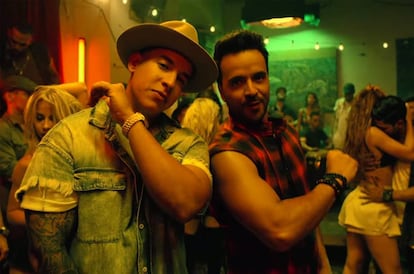Has ‘Despacito’ sparked a 45% increase in visitor numbers to Puerto Rico?
The Latino media’s claims do not withstand scrutiny, but why let the facts get in the way of a good story?


Unless you’ve been living in a cave for the last few months, you will likely have heard Despacito, the Spanish-language global pop hit by Puerto Rican duo Luis Fonsi and Daddy Yankee. You may even have been tempted to dance to it; but will it have prompted you to take a vacation in Puerto Rico? Several stories in the Spanish and Latino media now claim the song is responsible for a 45% increase in tourism on the Caribbean island since it was released in January.
Nobody can deny the song’s success, the video of which has been seen more than 2.6 billion times on YouTube and has made Daddy Yankee the first Latin artist to hit the top of Spotify’s international chart. But its impact on Puerto Rico’s tourism industry remains open to doubt.
To start with, where does the claim of a 45% increase in visitor numbers to the US territory come from, a figure that has even been cited by such prestigious titles as Billboard? There seems to be no official source from Puerto Rico itself. Some media stories are more cautious about the figure, saying simply that there has been a 45% increase in interest in taking a vacation in Puerto Rico.
Nobody seems to know exactly where the 45% increase in tourism originated
Among the sources cited by some media outlets are Argentinean news site Infobae and El Nuevo Día, Puerto Rico’s leading newspaper. Infobae doesn’t give a source, while El Nuevo Día cites the former, as well as talking to the Latin American division of Hoteles.com, which while not confirming the 45% figure, says “popular culture has a strong influence” on people’s travel plans, and that “as Puerto Rico is the home of singers Luis Fonsi and Daddy Yankee, and is also receiving a lot of attention for the success of the song, this seems to have encouraged more people to explore this great destination.”
After El Nuevo Día published the story, Hoteles.com joined the list of sources cited by the media attributing the 45% figure as referring to people interested in visiting Puerto Rico. But this increase is not reflected, for example, in the number of searches on Google for “tourism in Puerto Rico,” which have remained stable over recent months compared to those of the last five years.
So just who can provide evidence to back the 45% figure? Puerto Rico’s official tourism office, La Compañía de Turismo de Puerto Rico, has still not given EL PAÍS figures on tourist arrivals for 2017, despite promising to do so, claiming its “electronic database” has run into “technical problems.” Nevertheless, even if it is not possible to corroborate the exact number of tourists who have visited Puerto Rico since January, two documents on the tourist office’s website offer clues.
The tourist office has published a report on hotel occupancy based on a survey carried out in 33 of the island’s biggest hotels, which shows that up until May, no month this year had seen greater occupancy than the same month in 2016. In May itself, a month after Despacito was given greater global prominence following a cover version of the song by Justin Bieber, hotel occupancy was at 65.5%, compared to 69.3% in May of 2016.
But in April, the last month that consolidated figures are available for, cruise traffic to the island did establish a new record: 143,862 passengers, a 40.5% increase on the same month for 2016, although in March, the figure fell by 15.2%. That said, La Compañía de Turismo de Puerto Rico itself said that the increase was not due to Luis Fonsi and Daddy Yankee, but to expansion of the docks at the country’s capital of San Juan, “improved infrastructure,” and “incentives for airlines and cruises” that attracted huge vessels such as Jewel of the Seas, Carnival Fascination, Disney Magic and Star Legend, which also make stops in other Caribbean ports.
What role has Justin Bieber played in boosting interest in a holiday in Puerto Rico?
To put the claims by the Latino media of a 45% increase in visitor numbers to Puerto Rico into context, South Africa’s Interior Ministry says that it saw a 24% increase in tourists as a result of hosting the 2010 World Cup, while in Brazil, cities that hosted World Cup matches in 2014, saw an increase in foreign visitors of 13.85%.
Is it really possible then, that tourism in Puerto Rico has grown by 45% thanks to Despacito? Luis Fonsi certainly has a global mega-hit on his hands, but so far, there are no figures to confirm that people are flocking to Puerto Rico as a result.
English version by Nick Lyne.
Tu suscripción se está usando en otro dispositivo
¿Quieres añadir otro usuario a tu suscripción?
Si continúas leyendo en este dispositivo, no se podrá leer en el otro.
FlechaTu suscripción se está usando en otro dispositivo y solo puedes acceder a EL PAÍS desde un dispositivo a la vez.
Si quieres compartir tu cuenta, cambia tu suscripción a la modalidad Premium, así podrás añadir otro usuario. Cada uno accederá con su propia cuenta de email, lo que os permitirá personalizar vuestra experiencia en EL PAÍS.
¿Tienes una suscripción de empresa? Accede aquí para contratar más cuentas.
En el caso de no saber quién está usando tu cuenta, te recomendamos cambiar tu contraseña aquí.
Si decides continuar compartiendo tu cuenta, este mensaje se mostrará en tu dispositivo y en el de la otra persona que está usando tu cuenta de forma indefinida, afectando a tu experiencia de lectura. Puedes consultar aquí los términos y condiciones de la suscripción digital.








































